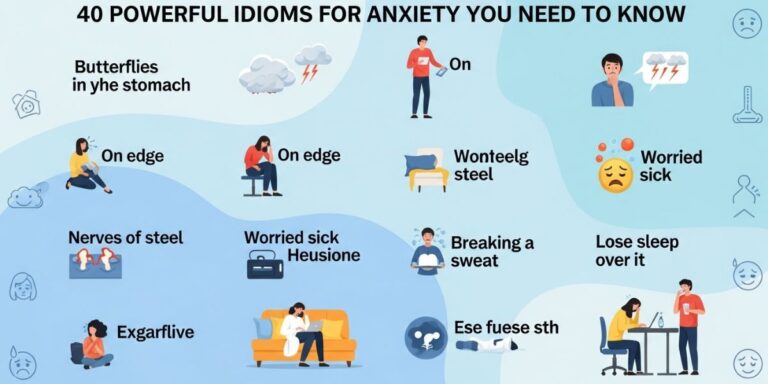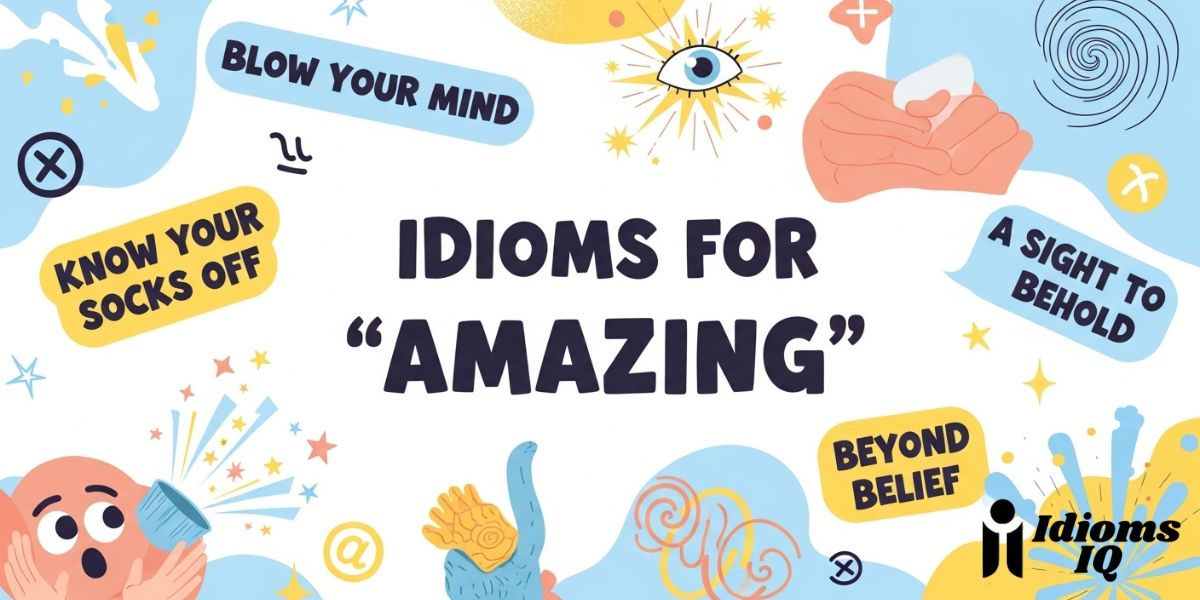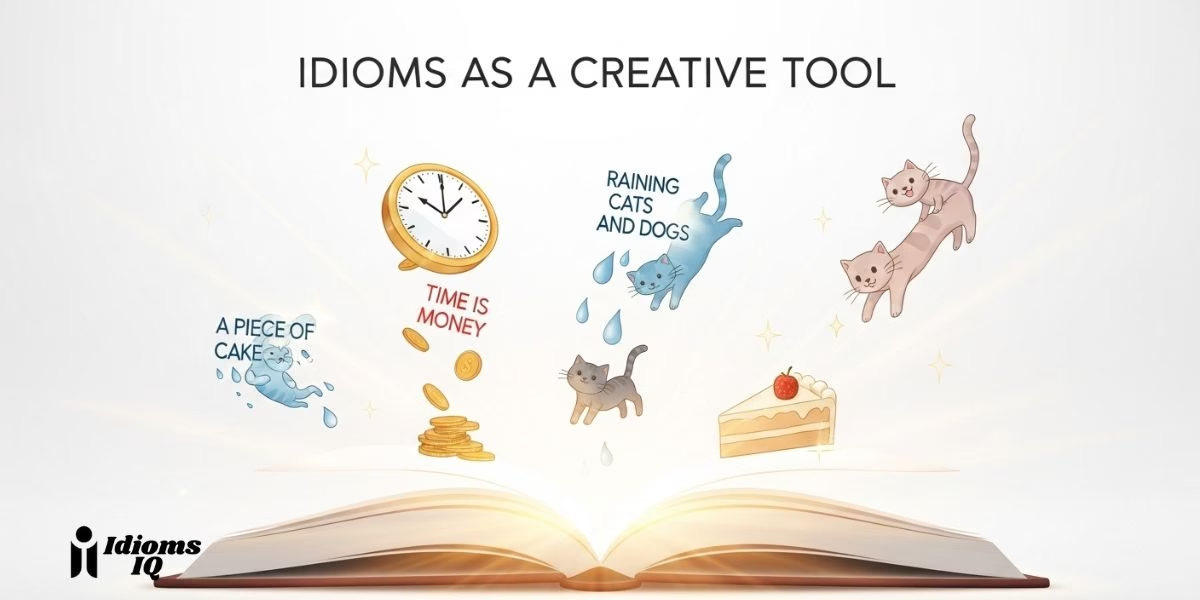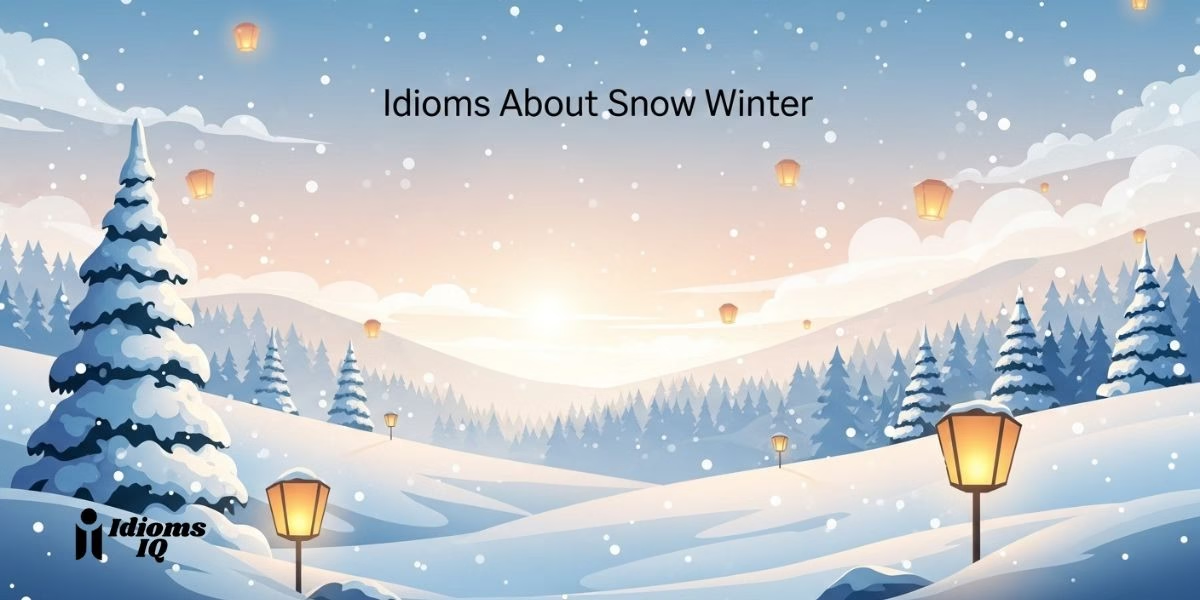
Even if you live where the sun always shines, the imagery of snow its pristine beauty, its biting cold, and its power to transform the world is a universal part of our language.
We use the idea of snow and winter to talk about everything from our work lives to our emotions. To do this, we use idioms: those frosty, creative phrases where the meaning isn’t what you’d expect from the individual words.
When you’re “snowed under,” you’re not buried in a blizzard; you’re just incredibly busy! In art and literature, idioms add a layer of atmosphere and feeling. This article explores 40 cool Idioms for Snow and winter to help your vocabulary sparkle with creativity.
What is the meaning of the idiom for snow is coming?
The phrase “snow is coming” most often means exactly what it sounds like: a snowstorm is predicted or is about to begin. However, the meaning can change completely depending on the context. If someone says it in a serious or ominous way, they might be using “snow” as a metaphor for a difficult time or trouble that is on the horizon, much like a real blizzard can be a hardship.
It’s also worth knowing that in slang, “snow” can be a code word for an illegal drug, so in that specific situation, the phrase could mean that a drug delivery is expected. To understand the true meaning, you have to pay close attention to who is speaking and how they are saying it.
Related: Idioms for Cold
Cool Idioms About Snow and Winter
Here is a flurry of idioms related to snow, ice, and the cold to add to your vocabulary.
1. To Be Snowed Under
- Meaning: To be overwhelmed with a huge amount of work or tasks.
- Usage Example: “I can’t come out tonight; I’m completely snowed under with homework.”
- This idiom creates a vivid image of being buried under a mountain of paperwork as if it were snow.
2. A Snowball’s Chance in Hell
- Meaning: To have absolutely no chance of success.
- Usage Example: “He had a snowball’s chance in hell of winning the lottery, but he bought a ticket anyway.”
- This humorous idiom is based on the idea that a snowball would melt instantly in the heat of hell.
3. The Snowball Effect
- Meaning: A situation where something starts small and then grows bigger and bigger at an accelerating rate.
- Usage Example: “The rumor started with one person, but with social media, it created a snowball effect and soon everyone was talking about it.”
- This phrase comes from the image of a small snowball rolling down a hill and gathering more snow until it becomes huge.
4. Pure as the Driven Snow
- Meaning: To be morally pure, innocent, and chaste.
- Usage Example: “She had a reputation for being pure as the driven snow, always kind and honest.”
- “Driven snow” refers to fresh, untouched snow that has been blown into a clean drift by the wind.
5. A Snow Job
- Meaning: An insincere or deceptive story told to trick someone.
- Usage Example: “The salesman gave me a real snow job about the car’s features, but I knew it wasn’t true.”
- This idiom suggests that someone is trying to “cover up” the truth with a flurry of deceptive words.
6. To Be Snowed In
- Meaning: To be trapped somewhere, usually in your home, because of a heavy snowfall.
- Usage Example: “We were snowed in for three days during the blizzard, with no way to leave the house.”
- This is a literal idiom, but it’s often used to describe a cozy and sometimes welcome confinement.
7. To Break the Ice
- Meaning: To say or do something to relieve tension and start a conversation in a social situation.
- Usage Example: “He told a funny joke to break the ice at the start of the meeting.”
- This idiom comes from the literal act of breaking ice on frozen rivers to allow ships to pass.
8. To Be on Thin Ice
- Meaning: To be in a risky or precarious situation where you could easily get into trouble.
- Usage Example: “After being late for the third time this week, he is on thin ice with his boss.”
- This phrase creates a clear image of the danger of walking on ice that is about to break.
9. The Tip of the Iceberg
- Meaning: Only a small, visible part of a much larger problem that is hidden from view.
- Usage Example: “The reported cases of the disease were just the tip of the iceberg; many more people were sick.”
- This comes from the fact that about 90% of an iceberg is submerged beneath the water.
10. To Give Someone the Cold Shoulder

- Meaning: To deliberately ignore someone or treat them in an unfriendly way.
- Usage Example: “After their argument, she gave him the cold shoulder for the rest of the day.”
- This idiom is thought to originate from the old custom of giving a guest a “cold shoulder of mutton” as a polite way to signal it was time for them to leave.
11. To Get Cold Feet
- Meaning: To suddenly become too nervous or frightened to do something you had planned.
- Usage Example: “He was going to ask for a raise, but he got cold feet at the last minute.”
- This phrase describes a loss of courage or nerve just before a significant event.
12. To Put Something on Ice
- Meaning: To postpone or delay a plan or project.
- Usage Example: “They decided to put the new project on ice until they had more funding.”
- This idiom compares delaying a plan to putting food on ice to preserve it for later.
13. My Blood Ran Cold
- Meaning: To have a sudden and strong feeling of fear or horror.
- Usage Example: “When I heard the strange noise from the empty room, my blood ran cold.”
- This idiom describes the physical sensation of a chill running through your body when you are terrified.
14. In Cold Blood
- Meaning: To do something cruel or violent without any emotion or pity.
- Usage Example: “The villain in the movie committed the crime in cold blood.”
- This phrase is often used in a legal context to describe a premeditated and heartless act.
15. A Cold Fish
- Meaning: A person who is unemotional, unfriendly, and shows no affection.
- Usage Example: “He’s a very efficient manager, but he’s a bit of a cold fish and never socializes with the team.”
- This is a critical term for someone who lacks warmth and emotional expression.
16. To Be Left Out in the Cold
- Meaning: To be excluded or ignored by a group.
- Usage Example: “All his friends were invited to the party, but he was left out in the cold.”
- This idiom creates an image of someone being physically shut out of a warm, welcoming place.
17. A Frosty Reception
- Meaning: A very unfriendly and unwelcoming greeting.
- Usage Example: “When he finally arrived late, he was met with a frosty reception from his angry parents.”
- This phrase is used to describe a greeting that is noticeably cold and hostile.
18. The Dead of Winter
- Meaning: The coldest, darkest, and most lifeless part of winter.
- Usage Example: “It’s hard to find fresh fruit in the dead of winter.”
- This phrase emphasizes the bleakest and most challenging period of the winter season.
19. A Winter of Discontent
- Meaning: A period of unhappiness, dissatisfaction, and unrest.
- Usage Example: “After the new laws were passed, the country entered a winter of discontent with widespread protests.”
- This literary idiom comes from the opening line of Shakespeare’s play Richard III.
20. To Weather the Storm
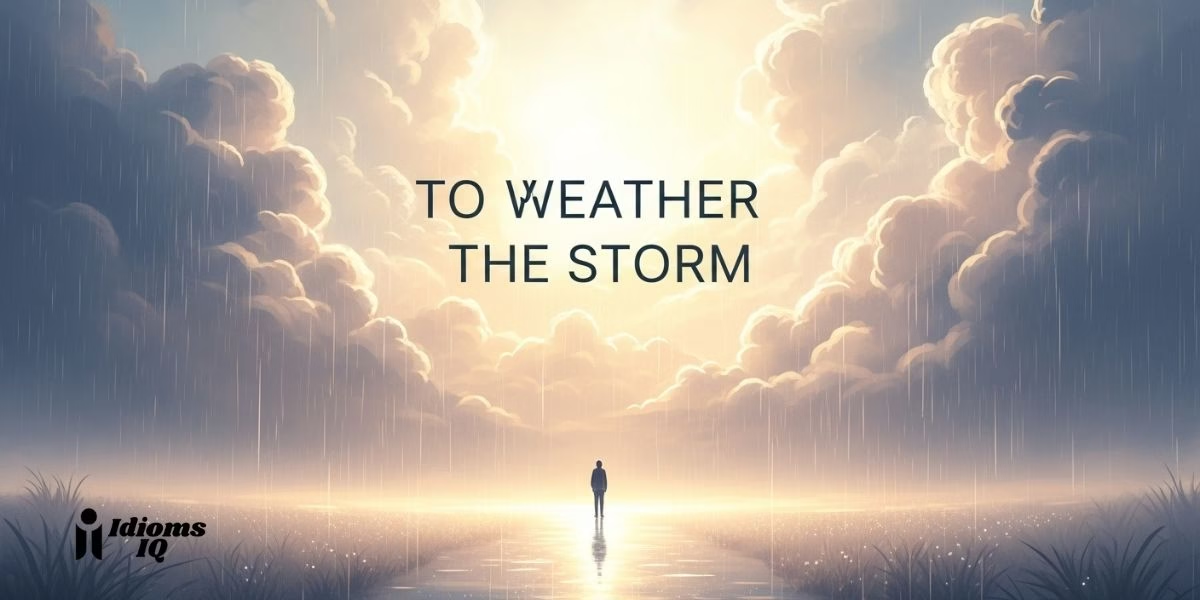
- Meaning: To survive a difficult or dangerous period.
- Usage Example: “The small business managed to weather the storm of the economic recession.”
- This idiom compares surviving a difficult life event to a ship safely navigating a storm.
21. A Blanket of Snow
- Meaning: A thick, even layer of snow that covers the ground.
- Usage Example: “He woke up to find a fresh blanket of snow covering the entire landscape.”
- This is a very common and gentle metaphor for a new snowfall.
22. To Be Frozen Out
- Meaning: To be excluded from a group or activity through unfriendly behavior.
- Usage Example: “After she disagreed with the team captain, she was frozen out of the strategy meetings.”
- This is a more active version of being “left out in the cold.”
23. Cold Comfort
- Meaning: Poor or inadequate consolation for a problem or disappointment.
- Usage Example: “Losing the game by one point instead of twenty was cold comfort to the defeated team.”
- This phrase means that the “comfort” being offered is not very comforting at all.
24. A Cold Snap
- Meaning: A sudden, short period of very cold weather.
- Usage Example: “We had a surprising cold snap in May, and I had to get my winter coat back out.”
- This is a common meteorological term used in everyday conversation.
25. A Winter’s Tale
- Meaning: A fantastical, romantic, or sad story that is not to be taken too seriously.
- Usage Example: “He told us a long and complicated story about his adventures, but it sounded like a bit of a winter’s tale.”
- This idiom is also the title of a famous play by William Shakespeare.
26. Snowed Under with Paperwork
- Meaning: A specific version of “snowed under” used to describe being overwhelmed with office work.
- Usage Example: “I can’t take a vacation this month; I’m completely snowed under with paperwork.”
- This idiom is very common in a business or academic setting.
27. A Snowball’s Chance
- Meaning: A shortened, more informal version of “a snowball’s chance in hell,” meaning no chance at all.
- Usage Example: “Without a proper education, he doesn’t have a snowball’s chance of getting that job.”
- This version is slightly less vulgar and more suitable for general conversation.
28. To Freeze Someone Out
- Meaning: To deliberately exclude someone from a group or activity by being unfriendly and unwelcoming.
- Usage Example: “After their disagreement, the rest of the team started to freeze him out of their conversations.”
- This is an active phrase that emphasizes the deliberate nature of the social exclusion.
29. To Run Hot and Cold
- Meaning: To frequently change your feelings or opinions about someone or something.
- Usage Example: “I can’t tell if she likes me; she runs hot and cold, friendly one day and distant the next.”
- This idiom describes an inconsistent and unpredictable attitude.
30. Skating on Thin Ice

- Meaning: A more active version of “on thin ice,” emphasizing that someone is currently engaging in risky behavior.
- Usage Example: “By ignoring the final warnings, you are skating on thin ice.”
- This phrase highlights the ongoing risk and the person’s active role in the dangerous situation.
31. To Pour Cold Water On
- Meaning: To be negative or discouraging about someone’s enthusiastic idea or plan.
- Usage Example: “He was excited about his new invention, but his boss poured cold water on it by listing all the potential problems.”
- This idiom is used to describe the act of dampening someone’s excitement.
Related: Idioms for Autumn
32. To Get the Cold Shoulder
- Meaning: To be treated in an unfriendly or unwelcoming way by someone you know.
- Usage Example: “I thought we were friends, but when I saw her at the party, I got the cold shoulder.”
- This is the passive version of “give the cold shoulder,” focusing on the person receiving the unfriendly treatment.
33. To Be Snowblind
- Meaning: To be so overwhelmed or impressed by something that you cannot see its faults (figurative use).
- Usage Example: “He was so in love that he was snowblind to all of her flaws.”
- This borrows the literal term for temporary blindness caused by the sun’s glare on snow to describe a figurative blindness.
34. To Break Out in a Cold Sweat
- Meaning: To begin sweating from fear, anxiety, or nervousness, even though you feel cold.
- Usage Example: “Thinking about his upcoming speech made him break out in a cold sweat.”
- This idiom describes a common physical reaction to intense fear or stress.
35. To Send Shivers Down Your Spine
- Meaning: To make you feel very scared, thrilled, or excited.
- Usage Example: “The ghost story was so creepy it sent shivers down my spine.”
- This phrase can be used for both fear and intense excitement, like listening to powerful music.
36. When Hell Freezes Over
- Meaning: A humorous and emphatic way to say that something will never happen.
- Usage Example: “He said he’ll apologize when hell freezes over, so I’m not expecting it anytime soon.”
- This idiom relies on the absolute certainty that hell, a place of fire, will never freeze.
37. A Cold Day in July
- Meaning: An event that is very unlikely to ever happen.
- Usage Example: “It’ll be a cold day in July before that lazy cat ever catches a mouse.”
- This is a common American variation of “when hell freezes over,” using a weather-based impossibility.
38. The Cold, Hard Truth
- Meaning: The unpleasant but true facts about a situation, without any sugar-coating.
- Usage Example: “It’s time to face the cold, hard truth: the company is failing.”
- This phrase is used to introduce a reality that may be difficult to hear.
39. To Blow Hot and Cold
- Meaning: To be inconsistent in your attitude towards someone or something.
- Usage Example: “Her boss blows hot and cold; one day he praises her work, the next he criticizes everything.”
- This is a common variation of “to run hot and cold,” used to describe mood swings or indecisiveness.
40. To Give You the Chills

- Meaning: To make you feel frightened, uneasy, or creeped out.
- Usage Example: “There’s something about that empty house that gives me the chills.”
- This idiom describes the physical sensation of coldness that can be caused by fear or an eerie atmosphere.
Practice Your New Vocabulary: Fill in the blanks
Ready to break the ice? Fill in the blanks with the best idiom from the list.
- I’d love to go on vacation, but I’m completely ________________ at work right now.
- If you keep showing up late, you’ll be ________________ with the manager.
- His plan to climb Mount Everest in sneakers has a ________________ of succeeding.
- She wanted to be a singer, but her parents ________________ on her dream.
- He was about to propose, but at the last moment, he ________________.
- The friendly host told a few jokes at the start of the dinner party to ________________.
- The scary movie was so effective it ________________.
- The fact that he only lost by a little was ________________ to the defeated candidate.
- She claims to be innocent, but the media portrays her as anything but ________________.
- The first sign of trouble was just the ________________; the real problems were much deeper.
Answers
- snowed under
- on thin ice
- a snowball’s chance in hell
- poured cold water
- got cold feet
- break the ice
- sent shivers down my spine
- cold comfort
- pure as the driven snow
- tip of the iceberg
Conclusion
Idioms for Snow, ice, and winter are a perfect example of how we use the natural world to give shape to our complex human emotions and situations. They allow us to describe feelings of being overwhelmed, socially excluded, or hopeful in a way that is both creative and instantly understood.
We encourage you to use these cool and crisp expressions to add a touch of winter’s magic to your vocabulary, no matter the climate you live in. If you enjoyed this collection, continue your journey by exploring our other articles on figurative language!


